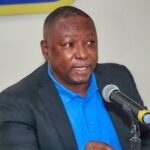The island’s secondary teachers’ union gave broad support for major government plans to overhaul education — but firmly rejected compulsory teacher licensing and criticised delays to the promised Teaching Service Commission, warning that the system still faces unresolved challenges.
The Barbados Secondary Teachers’ Union (BSTU) also seeks clarification on aspects of the intended abolition of the 11-plus examination, following Tuesday’s ministerial statement in the House of Assembly by Minister of Educational Transformation Chad Blackman.
The reform package features an overhaul of the Barbados Secondary School Entrance Examination (BSSEE), or 11-plus; major curriculum changes; early childhood interventions; expanded remedial education at the primary level; the licensing of teachers; the soon-to-be-appointed Teaching Service Commission; and the creation of a national parental education programme.
BSTU President Mary Redman said the bulk of the minister’s reforms stemmed from meetings between the unions and the Ministry of Education since the summer of 2023, including talks with Blackman as recently as March.
Redman told Barbados TODAY: “Much of what the minister has announced as constituting plans for the long-overdue changes in the conceptualisation and delivery of education, therefore, has resulted directly from many meetings with unions and other stakeholders. The minister’s general revelations are therefore neither new nor surprising to us; and we are happy to state that, as a union, the BSTU has contributed much to the process, and by extension to the plans, as expounded by the minister.
“There has obviously been expansion and refinement of some of the general areas that we would have discussed, and by and large, the union foresees no problem with those at this point in time. Indeed, they present exciting possibilities for developmental change in our society and economy.”
She continued: “Very recently at a Social Partnership meeting, the BSTU also made some suggestions in relation to curriculum reform; the increase in guidance counsellors and social workers within our school context; greater parental involvement in the students’ education; mandatory structured character-building activities, like uniform clubs; the extension of the school leaving age to 18; a community service component for students in the upper school, to name a few things. And so, the union is happy to see that some of these suggestions are included in the projected education transformational plans.”
Redman also said the BSTU supports the abolition of the Common Entrance Exam in its present form, arguing that her union had long disagreed with the method of transferring students from primary to secondary because it did not allow for the best outcomes for the students and its fairness is questionable.
“What has been proposed does reflect an amalgam of different suggestions made by various stakeholders at the meetings that we attended,” the union leader said. “And we will look forward to greater clarification of some aspects of the proposal in this regard.”
Redman said the union looks forward to further discussion on the proposed national service programme, as it considers this initiative to be a “very important” step in addressing the challenges of those to whom it is targeted.
She suggested that the planned residential and rehabilitative and therapeutic facility for students with behavioural problems is long overdue “and something that is music to our ears”.
“The BSTU has been advocating for such an institution for about two decades now and we are eagerly looking forward to its realisation,” Redman added.
But the BSTU opposes the licensing of teachers, a position that Redman said the union has expressed on more than one occasion: “It is our firm conviction that there is no need for such a step by the ministry. The minister has himself stated that over 75 per cent of our teachers are trained, and therefore qualified professionals. There are many issues to be discussed before such a plan can be implemented, and countries in the region which have teacher licensing, that most often coincide with teaching councils, which themselves have a negative history of conflict, and with regional teachers and their unions.”
The BSTU urged the ministry to move past “simply” announcing the pending establishment of the Teaching Service Commission.
Redman said: “We query the delay in realising such a commission for which provision has been made in the constitutional amendments of 1974. There are far too many unnecessary problems, and too high frustration levels and challenges that teachers face because of the lack of such a commission.” (EJ)
The post BSTU backs education reforms but opposes licences appeared first on Barbados Today.


